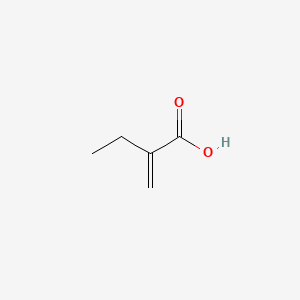| MeSH term | MeSH ID | Detail |
|---|---|---|
| Carcinoma, Basal Cell | D002280 | 6 associated lipids |
| Arrhythmias, Cardiac | D001145 | 42 associated lipids |
| Adenocarcinoma | D000230 | 166 associated lipids |
| Dermatitis, Contact | D003877 | 59 associated lipids |
| Dermatitis, Occupational | D009783 | 12 associated lipids |
| Lung Neoplasms | D008175 | 171 associated lipids |
| Body Weight | D001835 | 333 associated lipids |
| Edema | D004487 | 152 associated lipids |
| Bone Resorption | D001862 | 7 associated lipids |
| Brain Injuries | D001930 | 4 associated lipids |
2-Ethylacrylic acid
2-Ethylacrylic acid is a lipid of Fatty Acyls (FA) class. The involved functions are known as hemolysis.
Cross Reference
Introduction
To understand associated biological information of 2-Ethylacrylic acid, we collected biological information of abnormalities, associated pathways, cellular/molecular locations, biological functions, related genes/proteins, lipids and common seen animal/experimental models with organized paragraphs from literatures.
What diseases are associated with 2-Ethylacrylic acid?
There are no associated biomedical information in the current reference collection.
Possible diseases from mapped MeSH terms on references
We collected disease MeSH terms mapped to the references associated with 2-Ethylacrylic acid
PubChem Associated disorders and diseases
What pathways are associated with 2-Ethylacrylic acid
There are no associated biomedical information in the current reference collection.
PubChem Biomolecular Interactions and Pathways
Link to PubChem Biomolecular Interactions and PathwaysWhat cellular locations are associated with 2-Ethylacrylic acid?
There are no associated biomedical information in the current reference collection.
What functions are associated with 2-Ethylacrylic acid?
Related references are published most in these journals:
| Function | Cross reference | Weighted score | Related literatures |
|---|
What lipids are associated with 2-Ethylacrylic acid?
There are no associated biomedical information in the current reference collection.
What genes are associated with 2-Ethylacrylic acid?
There are no associated biomedical information in the current reference collection.
What common seen animal models are associated with 2-Ethylacrylic acid?
There are no associated biomedical information in the current reference collection.
NCBI Entrez Crosslinks
All references with 2-Ethylacrylic acid
Download all related citations| Authors | Title | Published | Journal | PubMed Link |
|---|---|---|---|---|
| Sedlák M | Homopolymer self-assembly into stable nanoparticles: concerted action of hydrophobic association and hydrogen bonding in thermoresponsive poly(alkylacrylic acid)s. | 2012 | J Phys Chem B | pmid:22280359 |
| Bashir MA and Radke W | Predicting the chromatographic retention of polymers: application of the polymer model to poly(styrene/ethylacrylate)copolymers. | 2012 | J Chromatogr A | pmid:22227362 |
| Lu T et al. | Influence of polymer size, liposomal composition, surface charge, and temperature on the permeability of pH-sensitive liposomes containing lipid-anchored poly(2-ethylacrylic acid). | 2012 | Int J Nanomedicine | pmid:23028220 |
| Ashauer R et al. | Significance of xenobiotic metabolism for bioaccumulation kinetics of organic chemicals in Gammarus pulex. | 2012 | Environ. Sci. Technol. | pmid:22321051 |
| Haghjou N et al. | Sustained release intraocular drug delivery devices for treatment of uveitis. | 2011 | J Ophthalmic Vis Res | pmid:22454753 |
| Abdel-Mohdy FA et al. | Preparation and characterization of chitosan hybrid membranes containing polyethylacrylate and polybutylacrylate. | 2011 | J. Membr. Biol. | pmid:22068566 |
| Ashauer R et al. | Acute toxicity of organic chemicals to Gammarus pulex correlates with sensitivity of Daphnia magna across most modes of action. | 2011 | Aquat. Toxicol. | pmid:21392493 |
| Bekheit MM et al. | Preparation and characterization of chitosan-grafted-poly(2-amino-4,5-pentamethylene-thiophene-3-carboxylic acid N'-acryloyl-hydrazide) chelating resin for removal of Cu(II), Co(II) and Ni(II) metal ions from aqueous solutions. | 2011 | Int. J. Biol. Macromol. | pmid:21277322 |
| Salmerón-Sánchez M et al. | Role of material-driven fibronectin fibrillogenesis in cell differentiation. | 2011 | Biomaterials | pmid:21185593 |
| Pandey S and Mishra SB | Graft copolymerization of ethylacrylate onto xanthan gum, using potassium peroxydisulfate as an initiator. | 2011 | Int. J. Biol. Macromol. | pmid:21693131 |
